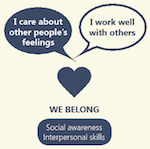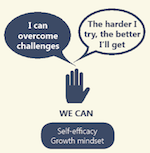 |
| Harry Talbot (far right) at the How Kids Learn IV Conference |
By Sam Piha
We were saddened to learn of the passing of Harry Talbot, Beyond the Bell - LAUSD. Harry served as Administrative Coordinator and his responsibilities included oversight of over 600 schools offering grant-funded before and after school programs. He facilitated the acquisition of Federal, State and private grants for over 100,000 students in before and after school programs on a daily basis and on weekends. Among his numerous accomplishments, he supported the development and implementation of several flagship after school programs such as the Take Action Leadership Campaign, Language in Action Program, StellarXplorers and the award winning CyberPatriot National High School Cyber Defense Program. For a complete bio, click here.
We worked alongside Harry for many years at the state and local level. He was a strong advocate for afterschool policy and a true innovator, particularly in programs serving high school youth.
We asked several of our colleagues if they would join in this celebration of Harry’s contributions to afterschool. Some of their responses can be found below.
 |
| Michael Funk, Director Expanded Learning Division California Department of Education |
He was relentless in honesty, transparency, and progress. On a personal note, he always asked me about my family before we talked about any business. He was a family first guy. I loved him, and I miss hearing his voice on my phone and face to face, while we shared our mutual love for our families. My family has a couple of stuffed animals in our home that he gave us, that are named, "Harry”.”
 |
| Brad Lupien, President & CEO ARC |
Through those early morning chats, Harry was able to pull a diverse team to launch the Take Action Campaign (TAC) in 2008. The TAC is a series of annual camping trips, service learning projects, arts showcases and high level student leadership retreats. At its height, the TAC was at 44 high schools in both LA and San Diego with over 8000 students involved. Since it’s humble launch the TAC has taught leadership, service and civics to over 50,000 youth. Harry also was early to the STEM discussion launching the CyberPatriot program within LAUSD. His early focus and consistent support allowed LAUSD to enter over 100 teams the past few years sending the first ever all girls team to the “finals” in D.C. where Harry was honored by the Airforce Association for elevating this important cyber security program that exemplifies the five LIAS principles.
Finally, our creative little team worked with Harry to rethink the definition of equitable access. By brilliantly asking the question, “how does inequity manifest itself in LA,” Harry took a chance and hit a home run with the Language in Action Program (LAP). LAP uses equitable access grants to teach language highly structured classes to ESL students with the ultimate goal of getting them reclassified and into leadership roles in the TAC in spite of the language barrier. Over 60 schools now have a robust LAP program. Our field and our students lost a giant when we lost Harry but his legacy lives on in the tens of thousands of students his creativity gave wings too.”
 |
| Kim Richards, CEO Boys & Girls Club of Carson |
Harry’s motto was “we are a team” and his actions demonstrated his commitment to working collaboratively every time we spoke. I can’t tell you how many times Harry went out of his way to remove obstacles for our organization’s success. He was our biggest cheerleader and a champion for outcome driven programming. Harry was a lifelong learner, always looking for new and innovative ways to help bring out the very best in CBO’s. Harry was a connector - whether it be piloting a new STEM program or sharing best practices, Harry made sure that all his partners were recognized for their accomplishments.”
 |
| Stu Semigran, Co-Founder & President EduCare Foundation |
Stu Semigran: “Many are saddened and are in the process of grieving. Harry as you know was one of a kind... so dedicated and an amazing and unique force in afterschool programs here in LA. He was loved by many and brought humor and teamwork with his distinct flair.
His mark, his service, and his good humor is remembered, felt, and valued by many. He is my friend and I miss him.”
















